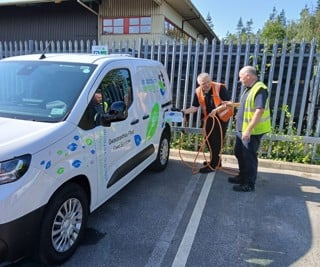Driver training needs a complete overhaul in order to tackle the real issue at the centre of accidents: behaviour.
Sergeant Gareth Morgan, a supervisor at South Wales Police driver training, believes the existing policy on risk management, whereby a high risk driver is simply sent on a training course, is the wrong approach in many circumstances.
He said: “90% of accidents are as a result of human behaviour – so why look at driving faults, it won’t affect the underlying causes of the accident.
“Training is focusing on the wrong issues. Companies need to look at the individual differences in driver behaviour and ask: what does it mean to you? How does it affect decision making? Can it support an investigation process? How can the organisation and individual affect behaviour?
“The driver knows what to do, but they don’t always do it – why? The coaching approach should be more facilitation to give the self-belief that an individual can make a difference to their risk.”
Morgan outlined three approaches to training:
- In-car training was labour intensive and expensive, he said.
- Situational data was basic and lacked depth, but was easy to gather.
- Attitudinal/behaviour assessments were cheap and easy to administer, gave a clear insight and enabled targeted training programmes to be developed.
South Wales Police undertakes psychometric profiling of both its drivers and the organisation. It then introduces its driving simulator to evaluate staff and create benchmark measurements. Finally, and only if necessary, it carries out an on-road evaluation.
“Psychometric profiling encourages drivers to reflect on their thoughts and change their driving behaviour. It delivers behavioural and attitudinal change and, by coaching and mentoring, improvements can be benchmarked that are recognised by the courts,” Morgan said. “This approach encourages ownership and helps you to understand how best to manage staff.”
He criticised the current preference for vehicle control training, claiming it was too subjective based on an assessor’s view, and assessments could not be carried out often enough.
South Wales Police’s simulator and its psychometric profiling both make the process objective.
“We look at goals for life and skills for living – lifestyle, age, group, culture, social position versus driver behaviour,” Morgan said.
“The model is to think about what they are doing and why and their feelings – it’s cognitive behaviour. Drivers often don’t realise what they were doing until this process takes place.”
Although the simulator is a £120,000 investment, Morgan says South Wales Police with its 800 vehicles will recoup the money within three years through reduced accidents and less frequent in-car training.
Morgan identified three requirements to achieving a successful outcome:
- It must become personal to the driver – a compelling reason for change.
- It must lead to outcomes they prefer to the other options.
- It must make sense and fit with their values, beliefs and commitments.
In addition, fleets need to consider the twin motivational forces of pain, such as failing a training course or not being accepted by colleagues, and pleasure, for example, speeding, feelings of control and self-esteem.
“Pain is the strongest motivator – people will do more to avoid pain than to gain pleasure,” he said.
As a result of the new approach to driver training, in association with supportive interventions, South Wales Police reduced its accident rate by 10% last year. Management is now engaged in the process and officers are open to the change in behavioural approach to coaching.
“We have designed our interventions based on our learnings from this approach,” Morgan said.
And he had one final warning for fleet operators that are still wavering over their risk management strategies: “Corporate manslaughter is coming your way, like it or not.”



















Login to comment
Comments
No comments have been made yet.